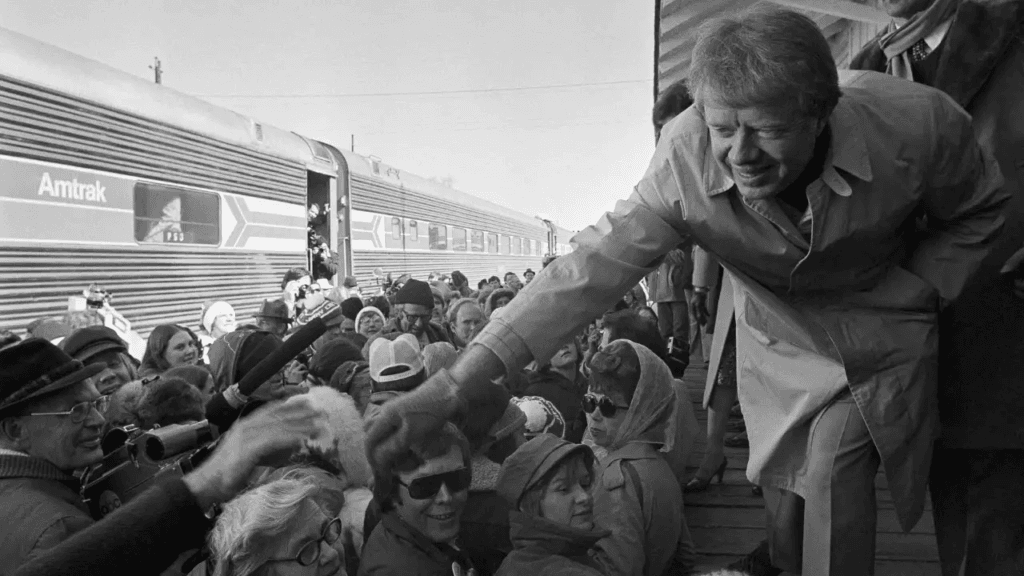Jimmy Carter, the 39th President of the United States and a Nobel Peace Prize laureate, passed away on December 29, 2024, at the age of 100. Carter, who was the longest-living former president, died peacefully at his home in Plains, Georgia, surrounded by his family. His passing marks the end of an extraordinary life dedicated to public service, human rights, and global peace.
A Century of Service
Jimmy Carter, Born on October 1, 1924, in Plains, Georgia, James Earl Carter Jr. rose from humble beginnings to become one of the most influential figures in modern American history. Before entering politics, Jimmy Carter graduated from the U.S. Naval Academy in 1946 and served as a naval officer. His early experiences instilled in him a commitment to discipline, leadership, and service, values that shaped his later career.
After leaving the Navy, Jimmy Carter returned to Plains to manage his family’s peanut farming business. His involvement in local community issues eventually led him to pursue a career in politics. Elected as the Governor of Georgia in 1971, Jimmy Carter gained national attention for his progressive policies and efforts to promote racial equality.
Presidency: 1977-1981
Jimmy Carter’s presidency began on January 20, 1977, with a pledge to restore trust in the government following the Watergate scandal. His administration was marked by significant achievements in domestic and foreign policy. Among his most notable accomplishments was the Camp David Accords, a landmark peace agreement between Egypt and Israel, which earned him international acclaim.
Domestically, Carter championed energy conservation, creating the Department of Energy to address the nation’s energy crisis. He also prioritized human rights, making them a cornerstone of U.S. foreign policy. However, his presidency faced challenges, including high inflation, unemployment, and the Iran hostage crisis, which overshadowed many of his achievements and contributed to his defeat in the 1980 election to Ronald Reagan.
A Life After the White House
While Carter’s presidency lasted only one term, his post-presidential years cemented his legacy as a global humanitarian. In 1982, he founded the Carter Center, an organization dedicated to promoting democracy, human rights, and public health worldwide. Through the Carter Center, he spearheaded initiatives to combat diseases like Guinea worm and river blindness, significantly reducing their prevalence.
Carter’s dedication to peace and democracy was evident in his efforts to monitor elections in more than 100 countries, ensuring fair and transparent processes. His contributions were recognized in 2002 when he was awarded the Nobel Peace Prize for his “decades of untiring effort to find peaceful solutions to international conflicts, to advance democracy and human rights, and to promote economic and social development.”
Personal Life and Milestones
Carter’s personal life was marked by his unwavering partnership with his wife, Rosalynn, whom he married in 1946. The couple recently celebrated their 78th wedding anniversary, setting a record for the longest marriage of any presidential couple. Together, they raised four children and were deeply involved in community service.
An avid craftsman, Carter often spent his free time woodworking and writing. He authored more than 30 books, covering topics ranging from his childhood in Georgia to reflections on faith and governance. Even in his later years, Carter remained active, frequently teaching Sunday school classes at his local church.
Tributes and National Mourning
News of Jimmy Carter’s passing has prompted an outpouring of tributes from leaders and citizens worldwide. President Joe Biden described Carter as “a man of extraordinary humility and vision who devoted his life to the betterment of humanity.” Former President Barack Obama highlighted Carter’s commitment to “human dignity and justice,” calling him an inspiration to generations.
In Plains, Georgia, residents have begun gathering to honor their hometown hero. Vigils are planned nationwide, with a state funeral expected to take place in Washington, D.C., followed by a private burial in Plains. The Carter family has requested that donations be made to the Carter Center in lieu of flowers, ensuring that his mission of peace and progress continues.
Legacy of a Lifetime
Jimmy Carter’s century-long journey exemplifies a life dedicated to service, resilience, and compassion. From his early days in rural Georgia to his role on the world stage, Carter consistently demonstrated an unwavering commitment to the principles of fairness, justice, and human dignity.
As the world reflects on his remarkable legacy, Carter’s impact on peacebuilding, human rights, and public health will undoubtedly endure for generations. His life serves as a reminder of the profound difference one individual can make, not just as a leader but as a global citizen committed to leaving the world better than they found it.
Conclusion
Jimmy Carter’s passing at the age of 100 marks the end of an era. His legacy is not merely one of political achievements but of a lifelong dedication to improving the lives of others. As the 39th President of the United States and a tireless advocate for peace and humanity, Carter’s contributions will continue to inspire and guide future generations in the pursuit of a more just and equitable world.
When Jimmy Carter met Manmohan Singh during visit to India
Also Read-
1. South Korean Plane Crash 179 Lives Lost: Investigations Begin After Distress Signal
2. Zeenat’s 300-Kilometer Adventure: Similipal Tigress Captured in Bengal’s Bankura

